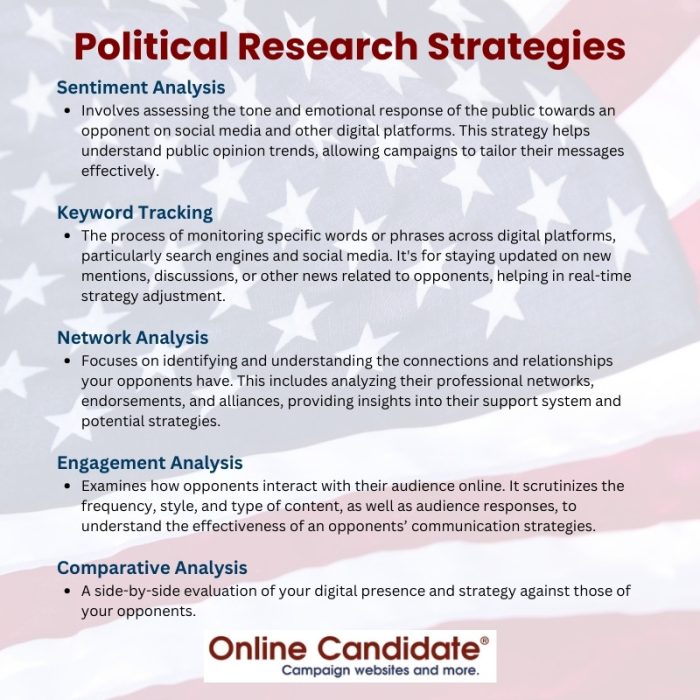In political campaigns, opposition research has moved from the paper archives of the past to online, digital data. Even for local political candidates, political opposition research and campaign intelligence analysis can give you a clear advantage.
This guide provides a blueprint for effective political competitor analysis. If you don’t learn about who and what you are up against, how can you campaign against it?
Highlights:
- Explore effective digital opposition research tools and platforms for first-time political candidates.
- Strategies for analyzing and using opposition research data.
- Learn techniques for discovering and archiving campaign research.
- Ethical standards and legal compliance you need to follow.
- Understanding the importance of adaptability as circumstances change.

Understanding Political Opposition Research
When running for political office, political adversary research is about gathering information about political rivals. This research covers a wide range of areas, including:
- Political background: Learn and understand your opponent’s political history. What offices have they held, what primary and general election difficulties did they face, and so on.
- Voting records: Analyzing how they’ve voted on key issues. Have they changed positions, and why? This is a key to effective opponent policy analysis.
- Public statements: Tracking speeches, interviews, and public communications.
- Campaign strategies: Studying their past and current approaches to campaigning. Did they focus on specific advertising or voter type?
- Personal background: Looking into their educational and professional history, where relevant to their political stance.
The goal is to build a comprehensive picture of your opponents, both professionally and, where relevant, personally. Or to quote Sun Tsu: “If you know the enemy and know yourself, you need not fear the result of a hundred battles.”
The Main Objectives of Opposition Research
Election opponent profiling serves several key objectives:
- Informing Strategy: It guides your campaign’s strategic decisions.
- Issue Identification: It helps identify critical issues and how your opponents have addressed them.
- Preparation: It prepares you for debates and public appearances by knowing potential arguments and counterpoints.
- Message Development: It aids in developing a clear and targeted campaign message.
| Aspect | Purpose | Tools/Methods | Considerations |
|---|---|---|---|
| Background Research | Understanding the opponent’s political and personal history | Search engines, social media platforms, news archives | Respect for privacy, accuracy |
| Voting Records and Public Statements | Analyzing political positions and public communications | Political databases, news archives | Fact-checking, legal compliance |
| Campaign Analysis | Studying campaign strategies and materials | Campaign websites, social media, public records | Ethical campaigning, message consistency |
| Legal and Ethical Standards | Ensuring research adheres to legal and ethical guidelines | Legal advisories, ethical guidelines | Compliance with election laws, positive messaging |
| Strategy Development | Turning data into actionable insights for the campaign | Sentiment analysis tools, network analysis | Adaptability, targeted messaging |
| Archiving | Preserving research data for future reference | Screenshot tools, document scanning apps, video recording | Organized storage, regular updates |
How Can Oppo Research Help Your Campaign?
Campaign reconnaissance plays a pivotal role in political strategy development and execution. It can start even before you start active election campaigning.
- Strategic Planning: Understanding your opponents is necessary for developing your campaign strategy. It dictates where to focus your efforts.
- Targeted Messaging: Tailoring your message becomes a lot easier when you know your opponent’s weaknesses and strengths.
- Voter Engagement: Knowing all sides helps address the concerns and questions of voters more effectively.
- Crisis Management: Being aware of potential opposition attacks or criticisms helps in preparing responses and managing crises.
During the 2004 U.S. presidential election, John Kerry, the Democratic nominee, faced a campaign by “Swift Boat Veterans for Truth,” a group that challenged his Vietnam War record. This opposition research campaign damaged the public’s perception of Kerry. It’s often credited as a large factor in the re-election of George W. Bush.
Strategy Development
Once you have gathered comprehensive information about your opponents, the next step is to turn raw data into actionable insights.
- Identify Key Themes: Look for recurring themes in your opponent’s history and public statements.
- Strengths and Weaknesses: Analyze both your strengths and your opponents’ weaknesses.
- Adaptability: Be prepared to adjust your strategies as new information comes to light. Opposition research is never a one-and-done.
In the 2012 U.S. presidential election, a significant piece of opposition research was prepared by a Republican operative against Mitt Romney, the Republican nominee. This dossier was initially prepared for use in the primary campaigns but was later reportedly used by the Democratic campaign, highlighting Romney’s career at Bain Capital and framing him as someone who profits from the failure of others.
Breaking down the information into actionable parts is the essence of strategy development. This approach helps your campaign remain responsive, focused, and effective.
https://www.onlinecandidate.com/free-political-campaigning-tips/
Your First Pass – Search Engines
Online tools are indispensable for conducting thorough opposition research. Each tool has a unique purpose and can provide specific types of information.
Search engines like Google and Bing are your first stop for gathering information.
- Broad Searches: Begin with general searches using your opponent’s name, adding terms like “policies,” “speeches,” or “interviews.” This can lead you to a variety of sources, providing an overview of their public presence.
- Specific Queries: Delve deeper with more focused searches. Include specific topics, past events, or controversies associated with your opponent. For instance, search for “[Opponent’s Name] education policy 2024” to find their specific statements or policies related to education.
Here are a few tips for better searches:
- Use quotation marks to find exact phrases.
- Try different combinations of keywords for a wider range of results.
- Look beyond the first page of the search results for hidden gems.
Leveraging Social Media Platforms
Social media platforms provide a window into your opponents’ public personas and voter interactions. However, some platforms require that you be a member in order to access other user profiles and information.
- Facebook and Twitter: These platforms are ideal for tracking real-time public statements, policy announcements, and voter feedback. Pay attention to the comments and shares to gauge public sentiment.
- LinkedIn: This platform offers insights into an individual’s professional history. Check for endorsements and recommendations that can hint at networks and influence.
- Instagram and TikTok: Useful for understanding personal branding and appeal, especially to younger voters. Observe the content style and engagement rates.
Social Media Research Tips:
- Set up notifications for new posts by your opponents.
- Analyze the tone and frequency of their posts.
- Monitor trending hashtags related to your opponents.
- Dig deep into past social media activity. You may find surprising or helpful material in the form of an old forgotten post or tweet!

You can learn a lot about a person from their personal and professional social media presence.
Exploring Political Databases and Websites
Specialized political databases provide in-depth information about candidates and elected officials. These tools work best for congressional and state offices.
- Ballotpedia.org: This is a comprehensive resource for candidates’ political history, election results, and policy positions.
- VoteSmart.org: Find detailed biographies, voting records, and public statements. It’s particularly useful for fact-checking.
Cross-reference information from multiple databases for accuracy. Look for patterns in voting behavior and policy stances that change over time.
Utilizing News Archives
News archives are invaluable for historical research.
- Major News Websites: They archive articles and interviews that can provide context to your opponents’ past actions and statements.
- Local Newspapers: Often contain more detailed stories about local events and issues your opponent may have been involved in.
Tips for navigating the news archives:
- Use specific time filters to find articles from crucial periods in your opponent’s career.
- Pay attention to both the content and the tone of the coverage.
Accessing Public Records – What Secrets Lie Within?
Public records are a factual resource for your research.
- Court Records: These can reveal any legal battles or controversies.
- Property Records: Offer insights into financial status and investments. Are there links to donors or key supporters?
- Campaign Finance Records: Show funding sources and spending patterns, crucial for understanding their financial backing and influences.
Using public records ethically:
- Always respect privacy laws and ethical boundaries.
- Use this information to understand their public and professional persona, not for personal attacks.
Analyzing Campaign Websites and Materials
Your opponent’s campaign materials can reveal their strategy and priorities.
- Official Website: Check their website for detailed policy platforms, press releases, and biographies. Analyze how they present their achievements and plans.
- Campaign Brochures and Flyers: These materials often contain the key messages and promises being made to voters. They can reveal the primary focus areas of your opponent’s campaign.
Effective Analysis of Campaign Materials:
- Follow social media accounts and look for inconsistencies in messages across different platforms.
- Compare their past and present campaign materials for shifts in stance or focus. This can be especially revealing in political campaigns, where shifts might align with public opinion trends or responses to opponents’ moves.
By combining data from diverse sources, you get a more comprehensive view of their political and public personas.
Ethical and Legal Considerations
Ethics and legality are non-negotiable in political campaigns. They should be front and center of your strategy development.
- Respect Privacy: Always respect the privacy of your opponents and their families. Don’t go into personal matters that don’t have public significance.
- Fact-Checking: Ensure that all information used in your campaign is accurate and fact-checked. Misinformation can backfire and damage your credibility.
- Legal Compliance: Be aware of and comply with all election laws and regulations. This includes rules about campaign advertising, fundraising, and voter engagement.
- Positive Campaigning: Focus on positive messaging. While it’s important to highlight differences between you and your opponents, avoid negative campaigning tactics that can be divisive.
Rules vary significantly across different jurisdictions. Each state, and sometimes each locality, may have its own set of regulations governing what’s permissible in political campaigns. For instance, some areas might have strict rules about accessing and using public records. Understanding these nuances can protect your campaign from unintended legal missteps.
One infamous example of opposition research going awry is the Watergate scandal. Operatives connected to President Richard Nixon’s re-election campaign broke into the Democratic National Committee’s headquarters at the Watergate office complex. This case of opposition research led to Nixon’s resignation under threat of impeachment.
In addition to the local laws, federal regulations often come into play, particularly regarding data privacy and campaign finance. Stay updated with the Federal Election Commission’s (FEC) guidelines. The FEC oversees the use of funds, advertising, and other federal campaign activities. A good practice is to consult with a legal expert specializing in election law.
Information Tactics and Strategies
To conduct thorough online research about your opponents, a multifaceted approach is necessary. Here are a few ways to monitor your opponents.
- Setting up Google Alerts:
- Choose a mix of general (e.g., opponent’s name) and specific keywords (e.g., “[Opponent’s Name] education policy”).
- Set the alert frequency to suit your needs, whether it’s as-it-happens or a daily digest.
- Adjust your settings as the campaign progresses to include new emerging keywords.
- Social Media Monitoring:
- Tools like Hootsuite or TweetDeck can monitor keywords across various social platforms.
- Create streams for different keywords so you can organize the information.
Run a Historical Analysis on Your Opponents
Understand the historical context of your opponents’ political journey. If you know where they’ve been, you may be able to predict where they are going.
- Using Online Archives:
- The Wayback Machine can show you archived versions of your opponents’ campaign websites or social profiles.
- Use this tool to check for shifts in messaging or policy stances over time.
- Reviewing Past Campaigns:
- Examine campaign materials, speeches, and debates from previous elections.
- Note any recurring themes or changes in their campaign strategy.
Create a timeline of significant events in your opponent’s career to spot patterns. Compare their past promises to current statements for consistency. This probably won’t come as a shock, but there’s often a difference between what a politician says and what a politician does.
Sentiment Analysis
Assessing public sentiment towards your opponents helps gauge their popularity and the effectiveness of their messaging.
- Utilizing Sentiment Analysis Tools:
- Tools like Brandwatch analyze the tone and sentiment of social media posts. However, these tools may not be very useful for tracking local candidate races.
- In particular, look for changes in public sentiment after major events or announcements.
- Monitoring Comments and Reactions:
- Observe the nature of interactions on your opponents’ social media posts.
- Pay attention to the ratio of positive to negative reactions.
Look for sudden changes in sentiment, as these can indicate a shift in public opinion. Cross-reference sentiment data with recent events or news stories for context.
Network Analysis
Analyzing who your opponents are connected with can reveal alliances and support networks.
- Mapping Their Network:
- Identify key figures in your opponents’ networks. They can include influencers, political allies, or significant endorsers.
- Use LinkedIn and Twitter to see who they are connected with and who interacts with their content.
- Monitoring Endorsements:
- Track public endorsements or support for your opponents.
- Analyze the potential impact of these endorsements on their campaign.
Regularly check for new connections or endorsements. Analyze the influence and reach of individuals in their network. This may lead to new discoveries.
Engagement Analysis
Studying how your opponents interact with their audience can provide insights into their engagement strategies.
- Reviewing Their Posts:
- Analyze the content, timing, and frequency of their posts.
- Observe which types of content receive more engagement.
- Observing Interaction Patterns:
- Look at how they respond to comments and engage with their followers and other commenters.
- Note the tone and style of their interactions—are they formal, informal, confrontational, or engaging?
Try to find engagement strategies that could benefit your campaign. Monitor for any engagement spikes that could indicate a successful or controversial post.
Comparative Analysis
Comparing your online presence and strategies to those of your opponents can highlight areas for improvement in your campaign.
- Comparing Social Media Strategies:
- Compare and contrast platform use, content style, and overall engagement levels.
- Look at the effectiveness of different types of posts—videos, images, text posts, etc.
- Analyzing Website Content:
- Compare your website content and overall site experience with your opponent’s site(s).
- Evaluate the clarity and appeal of messaging on your respective websites.
Use insights to refine your digital strategy and online presence. Continuously adapt and improve based on what you learn from these comparisons.

The Importance of Archiving
It’s not enough to just research. You need to save and preserve your information. You want to make sure that any valuable information or insights you find will be available for future reference.
You’ll also want to maintain records and evidence of your opponents’ public statements and stances. A dossier, if you will. Here are several methods to archive information, along with tips and instructions:
1. Taking Screenshots of Websites and Social Posts
How to Do It:
- On a PC: Press PrtScn to capture the entire screen, or Alt + PrtScn for an active window. Then paste it into an image editor or document.
- On a Mac: Press Shift + Command + 4 to select an area to capture, or Shift + Command + 3 to capture the whole screen.
- On smartphones: The method varies but often involves pressing the power and volume-down buttons simultaneously.
Tips: Ensure the date and time are visible in the screenshot, either from the website or your device’s timestamp. You’ll want to capture the entire screen, including URLs.
2. Using the Wayback Machine to Access Old Content
How to Use It:
- Go to the Wayback Machine website (archive.org/web).
- Enter the URL of the page you want to archive.
- If the page has been archived before, you’ll see a timeline of snapshots. If not, you can save the current version of the page by clicking on “Save Page Now.”
Tip: Check periodically and archive key web pages, as content might change or be deleted. Note the timestamp provided by the Wayback Machine for reference.
3. Saving Web Pages Locally
Not everything gets indexed by search engines or saved to an outside archive. However, you can save a webpage and all its elements to a local computer. Here’s how:
- Right-click on the webpage and select “Save Page As” to download a complete HTML copy.
- Use browser extensions like “Save Page WE” for Firefox or “SingleFile” for Chrome for a more streamlined experience.
Make sure that your saved pages retain important elements like text and images. Regularly backup saved content in the case of a computer failure.
4. Using Document Scanning Apps
How to Do It:
- Use apps like Adobe Scan, CamScanner, or Microsoft Office Lens to scan documents using your smartphone.
- These apps can convert photos into PDFs or other document formats.
Tips: Use good lighting and clarity when scanning documents. Store your scans in organized folders with clear naming conventions and keep them backed up.
5. Video Recording
Methods:
- For online videos, use screen-recording software. On Windows 10 and 11, you can use the built-in Xbox Game Bar; on macOS, use QuickTime Player.
- Record live events with a smartphone or video camera for physical events.
Tips: Always record with the highest quality possible, and make sure to note the date and time of the recording.
General Tips for Archiving
- Organization: Keep a well-organized archive with clear folder structures and file naming conventions. Include dates, sources, and brief descriptions in file names.
- Backups: Regularly backup your archives to multiple locations, such as an external hard drive and cloud storage, to prevent data loss.
- Documentation: Keep a log or database of what you’ve archived, including URLs, dates, and brief descriptions of the content.
- Legal and Ethical Considerations: Ensure that your archiving practices comply with legal standards and respect privacy and copyright laws.
Finally, don’t forget to regularly update and make backups of your data and archives. You’ll want to reference your information during the election.
Mastering Political Storytelling: Your Secret Campaign Weapon »







